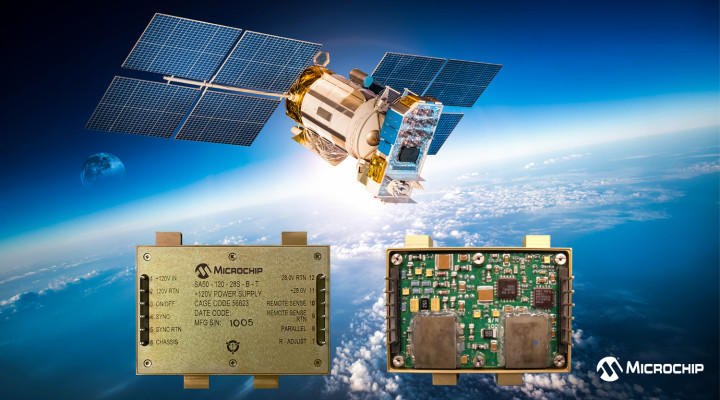Microchip Announces Space-Qualified COTS-Based Radiation-Hardened Power Converters
This is a submission from Microchip on the expansion of its SA50-120 power converter family with nine new units based on its Commercial Off-the-Shelf technology.
As reliance on communication and weather satellites grows and space research expands in scope and mission, new technology is required to help speed spaceflight system design and production. Microchip Technology Inc. announced the expansion of its SA50-120 power converter family with nine new units based on its Commercial Off-the-Shelf (COTS) technology. This technology provides developers with space-qualified power converters that help to minimize risk and lower development costs.
SA50-120 power converters utilize 120V input and offer up to 56W of output in a low profile, small-sized solution. These EMI compliant and radiation-hardened designs with single and triple outputs are ideal for Space Station and ORION program platforms. The units utilize switching regulators that use peak current mode controlled single-ended forward converter topology with inherent single-event immunity. Offering eight million hours Mean Time Between Failure (MTBF) and up to 87% efficiency – the highest of any standard 120V input space-grade DC-DC power converter, the SA50-120 maximizes system performance and reliability. The units are qualified to 100 krad (Si) Total Ionization Dose (TID) and Single Event Effects (SEE) greater than 80 MeV cm2/mg, and offer synchronization, a Transitor-Transitor Logic (TTL) on/off command signal, and various protection features. Single output versions additionally offer remote sense, output voltage adjust and parallel connection functions.
“Microchip’s 30-year legacy as a space technology partner spans more than 50 successful programs and platforms,” said Leon Gross, vice president of Microchip’s Discrete Products Group business unit “We continue to invest in the development of critical technology required for spaceflight.”
The company’s DC-DC power converter technology as well as its ISO 9000 and AS9100 certified fabrication facilities provide high-quality units through flexible manufacturing alternatives.
While introducing new advances based on COTS technology, the company also teams with system manufacturers and integrators on obsolescence management, supporting customers’ efforts to minimize redesign work and lengthen life cycles, thereby reducing overall system costs.
The company’s DC-DC power converters complement its diverse space portfolio of radiation-hardened and radiation-tolerant Field Programmable Gate Arrays (FPGAs); microcontrollers (MCUs), microprocessors (MPUs), timing products; semiconductors and point-of-load regulators; and high-reliability electromechanical, mission-critical and space-grade relays – providing designers with total system solutions for a wide variety of applications.

DC to DC power converters
Microchip’s SA50-120 radiation-hardened DC to DC power converters – the only standard non-hybrid space-grade DC-DC power converters available – utilize surface mount component construction, allowing flexibility and customization to fit specific applications and requirements. The SA50-120 family, qualified to Mil-Std-461, Mil-Std-883 and Mil-Std-202, enables designers to start with proven COTS technology and quickly scale up development, reducing risk and development time.SA50-120 power converters utilize 120V input and offer up to 56W of output in a low profile, small-sized solution. These EMI compliant and radiation-hardened designs with single and triple outputs are ideal for Space Station and ORION program platforms. The units utilize switching regulators that use peak current mode controlled single-ended forward converter topology with inherent single-event immunity. Offering eight million hours Mean Time Between Failure (MTBF) and up to 87% efficiency – the highest of any standard 120V input space-grade DC-DC power converter, the SA50-120 maximizes system performance and reliability. The units are qualified to 100 krad (Si) Total Ionization Dose (TID) and Single Event Effects (SEE) greater than 80 MeV cm2/mg, and offer synchronization, a Transitor-Transitor Logic (TTL) on/off command signal, and various protection features. Single output versions additionally offer remote sense, output voltage adjust and parallel connection functions.
“Microchip’s 30-year legacy as a space technology partner spans more than 50 successful programs and platforms,” said Leon Gross, vice president of Microchip’s Discrete Products Group business unit “We continue to invest in the development of critical technology required for spaceflight.”
The company’s DC-DC power converter technology as well as its ISO 9000 and AS9100 certified fabrication facilities provide high-quality units through flexible manufacturing alternatives.
While introducing new advances based on COTS technology, the company also teams with system manufacturers and integrators on obsolescence management, supporting customers’ efforts to minimize redesign work and lengthen life cycles, thereby reducing overall system costs.
The company’s DC-DC power converters complement its diverse space portfolio of radiation-hardened and radiation-tolerant Field Programmable Gate Arrays (FPGAs); microcontrollers (MCUs), microprocessors (MPUs), timing products; semiconductors and point-of-load regulators; and high-reliability electromechanical, mission-critical and space-grade relays – providing designers with total system solutions for a wide variety of applications.
Development Tools
Microchip provides end-to-end design support to accelerate time to market including analysis, qualification and production. Designers can obtain numerous analysis and qualification reports on demand and engineering development units are available from stock.Availability
Microchip’s SA50-120S units are available in 3.3V, 5V, 12V, 15V and 28V outputs. SA50-120T units are available in 3.3V or 5V main output with 12V or 15V auxiliary outputs. These radiation-hardened units are available now for volume production and limited sampling. For additional information, contact a Microchip sales representative, authorized worldwide distributor or visit Microchip’s website.
